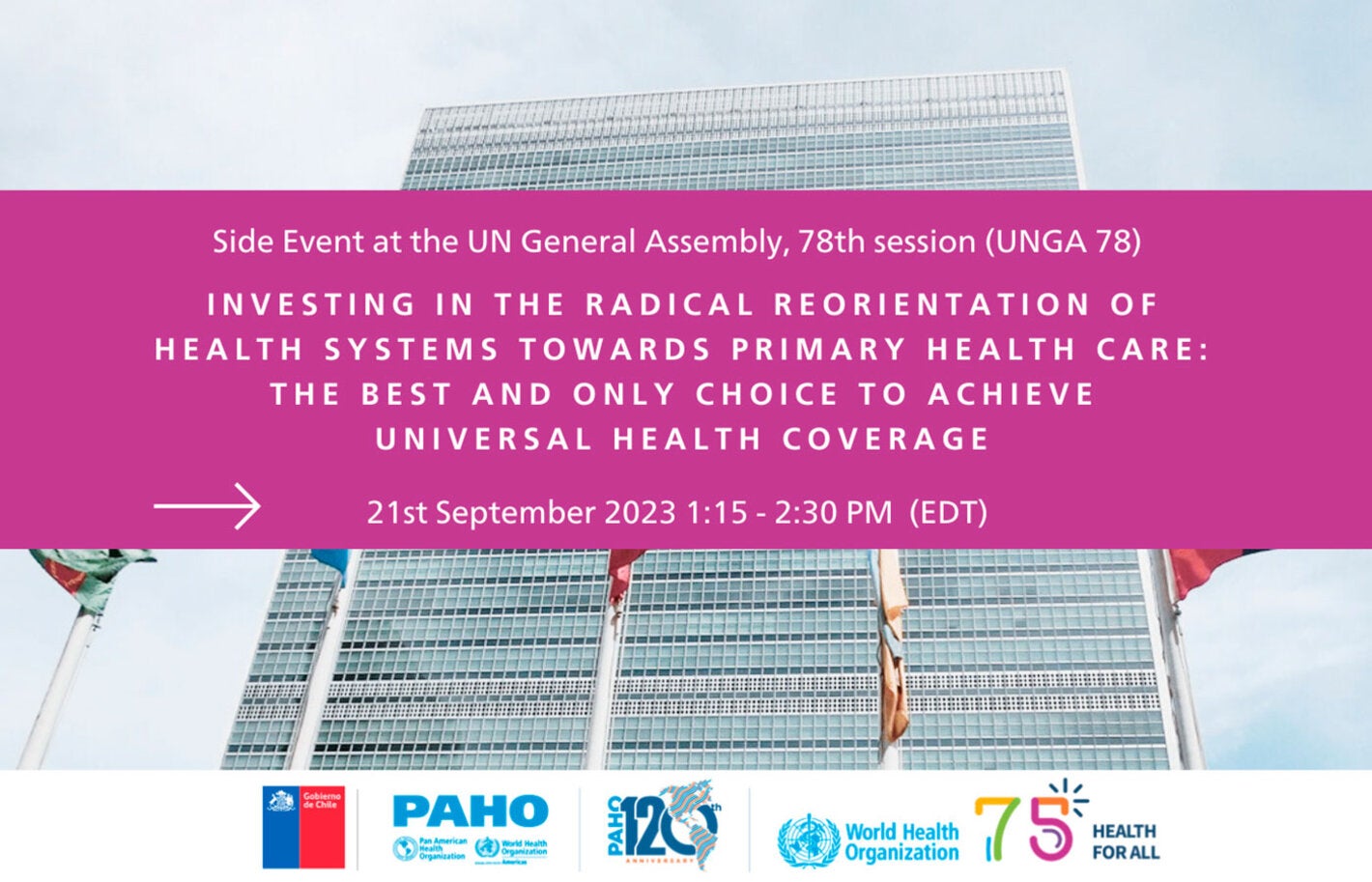
Organized by the Government of Chile, PAHO and WHO.
21st September 2023 1:15 - 2:30 p.m. (EDT)
The meetings can be viewed live on UN WebTV.: https://media.un.org/en/asset/k15/k15f4mttlc
Master of Ceremony: Dr. Ximena Aguilera Sanhueza, Minister of Health, Republic of Chile
-
His Excellency Gabriel Boric Font, President of the Republic of Chile
-
Dr. Tedros Adhanom Ghebreyesus, Director-General, WHO
-
Dr. Jarbas Barbosa da Silva Jr., Director, PAHO
Panel Discussion, Opportunities and Challenges for the Radical Reorientation of Primary Health Care
Moderation: Dr. Ximena Aguilera Sanhueza, Minister of Health, Republic of Chile
Challenges for the radical reorientation of Primary Health Care:
-
Mr. William James Quince, Minister of State for Health, United Kingdom
-
Dr. Nísia Trindade, Minister of Health, Brazil
-
Dr. Khaled Abdel Ghaffar, Minister of Health and Population, Arab Republic of Egypt
-
Dr. Jaime Saavedra, Director, LAC Human Development, World Bank Group
Opportunities for the radical reorientation of Primary Health Care:
-
Dr. Maria Teresa Barán, Minister of Health, Paraguay
-
Dr. Azhar Giniyatovna Giniyat, Minister of Health Care, Kazakhstan
-
Dr. Roopa Dhatt, Executive Director and Co-Founder, Women in Global Health
Remarks from High Level Participants from the audience
-
Dr. Karina Rando, Minister of Health, Republic of Uruguay
Closing Remarks:
-
Dr. Ximena Aguilera Sanhueza, Minister of Health, Republic of Chile
-
Dr. Bruce Aylward, Assistant Director-General, Universal Health Coverage, Life Course, WHO
Background:
The COVID-19 pandemic has significantly affected health, lives, and livelihoods around the world and has caused a social and economic crisis characterized by mass unemployment, increased impoverishment, and exacerbation of longstanding inequities. At the mid-point of 2023, the world is off track to meet the Sustainable Development Goals, including health. Even prior to the pandemic more than 30% of the world population could not access essential health services and almost two billion people faced financial hardship. Service coverage was improving but financial protection was worsening, with regional variations. During the pandemic, essential health services were disrupted in over 90% of countries. These headlines are the aggregation of insufficient progress in the delivery of specific services, disease control and prevention, and in addressing the needs of specific population groups. For example, 14.3 million children were not immunized in 2022 – also referred to as zero-dose children. For non-communicable diseases (NCDs) only 14 countries are on track to achieve SDG 3.4 by 2030; hypertension causes 32% of all deaths but only 54% of cases are diagnosed, 42% of those treated and 21% treated and controlled.
The critical path to recovery and progress toward the Sustainable Development Goals requires political commitment and investment in Primary Health Care (PHC), which provides the unified cornerstone for addressing multiple health priorities. Investing in PHC is key to building the foundation of a resilient health system that meets the needs of the entire population both in emergencies and in routine circumstances. Indeed, it is estimated that 90 percent of health services can be delivered through PHC in an equitable, efficient, and cost-effective manner. Moreover, scaling-up PHC interventions across low- and middle-income countries could save 60 million lives and increase average life expectancy by 3.7 years by 2030. A PHC approach and orientation of health systems is central to sustaining progress towards universal health coverage, health security, and health-related sustainable development goals. Resilience is enhanced through such an approach, which implies the sustainability of services and recuperation of population health gains that have been impacted by the pandemic.
2023 represents a landmark year in the global health arena, and the United Nations system, as the world prepares for the 78th Session of the United Nations General Assembly (UNGA) and the UN High-level meeting on Universal Health Coverage (UHC). This agenda will gather the Head of States and key stakeholders to discuss progress made on implementing the 2019 Political Declaration and offer an opportunity to reinvigorate efforts towards delivering health for all. The UNGA has also convened Member States for a second SDG Summit in 2023, marking the mid-point of the 2030 Agenda. Finally, 2023 will also be the year of celebration and accountability for the fifth anniversary of the Declaration of Astana on PHC, which provides an opportunity to take stock and redirect attention to the radical reorientation of health systems towards PHC.
It is within this post-COVID context that a fundamental change in priorities is required in the global health agenda. There is an urgent need to ensure capacity to build and embed resilience within societies and health systems, based on an inclusive and comprehensive PHC approach tailored to country contexts. The side-event will focus on exploring ways and means to implement investment strategies and urgently accelerate progress on PHC.
The side-event will focus on exploring ways and means to implement investment strategies and urgently accelerate progress.
Objectives:
-
Through concrete country examples, demonstrate that reorienting health systems towards PHC is politically and technically feasible: vision, action, and results.
-
Discuss the need for a long-term investment in health systems that are designed and operated on the foundation of PHC.
-
Articulate how the PHC approach constitutes a core pillar of emergency response and builds resilience within health systems and societies.
-
Highlight how PHC can facilitate the recuperation of lost public health gains and accelerate action towards SDGs, proposing key actions for the future.
Target audience: participants of the HLM on UHC; Ministers of Health, Finances, and Foreign Affairs; health authorities’ representatives; senior advisors and policymakers responsible for the design and implementation of national health policies; partners from global financing institutions; representatives of international organizations, civil society, youth organizations, and academia.
